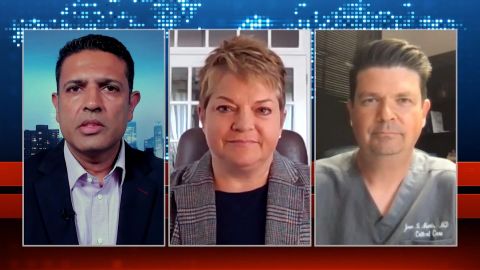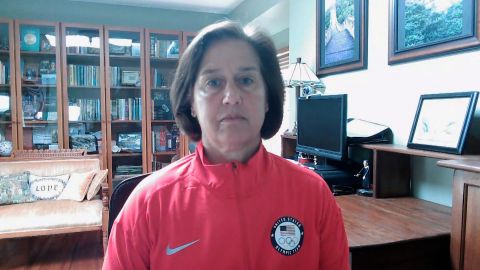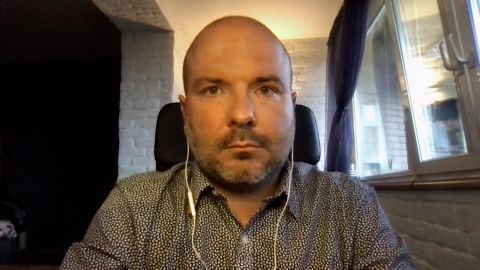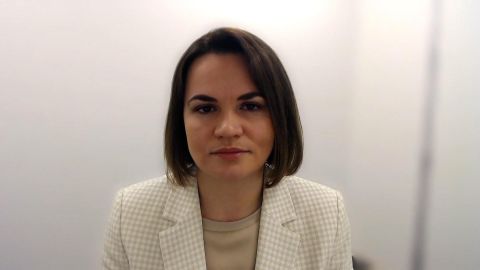Read Transcript EXPAND
BIANNA GOLODRYGA: Well, now, to the pandemic. Today, President Biden will announce a vaccination requirement for federal workers. This as vaccine hesitancy persists, despite the rapid spread of the Delta variant. In Tennessee, where only 39 percent are fully inoculated, Republican senators are urging people to get protected. Dr. Michelle Fiscus says that she was fired from States Health Department. Here she is speaking to Hari Sreenivasan alongside critical care doctor, Jason Martin, about all of the controversy.
(BEGIN VIDEO CLIP)
HARI SREENIVASAN: Bianna, thanks. Dr. Michelle Fiscus, Dr. Jason Martin, thank you both for joining us. First, Dr. Fiscus, for our audience numbers who haven’t been attention to what’s been happening in Tennessee, why are you now the former medical director of the Tennessee Vaccine and Immunization Program? What led to that?
DR. MICHELLE FISCUS; FORMER MEDICAL DIRECTOR, TENNESSEE VACCINE AND IMMUNIZATION PROGRAM: Well, thanks for having me on, Hari. I sent out a memo to our COVID-19 vaccine providers in Tennessee, letting them know about the mature minor doctrine in Tennessee, which has been in place since 1987, and allows that children ages 14 and older can seek medical care on their own without parental consent if their medical provider feels that that individual is mature enough to make those decisions.
SREENIVASAN: What were you trying to accomplish?
FISCUS: Well, the memo that I sent out was in response to requests for information from those very providers who wanted to know, what do I do if a 15-year-old drives up, you know, with some friends and asks for a vaccine, can we provide it to them or not? And so, I reached out to our Office of General Counsel for that language and shared that. And that is what some of our legislators felt was trying to undermine parental authority, in which eventually led to my termination from the department.
SREENIVASAN: Now, the chief medical officer of the state, I want to read a quote here, they said, this is because of “failure to maintain good working relationships with members of her team, her lack of effective leadership, her lack of appropriate management and unwillingness to consult with superiors and other internal stakeholders on projects.” What do you say to that?
FISCUS: Well, I sent an eight-page point-by-point rebuttal to that information that was released. Interesting that that letter that was dated July the 9th was not shared with me at my termination on July the 12th. And there are aspects of that letter that are demonstrably false, for example, the claim that I didn’t consult with legal counsel before sending out the mature minor doctrine letter to providers. And actually, the information that I sent out was provided to me by the Office of General Counsel, the Department of Health.
SREENIVASAN: And, Dr. Martin, how often does something like this get so heated, so political, in your time as a doctor in Tennessee?
DR. JASON MARTIN, CRITICAL CARE PHYSICIAN: Yes, this is the hottest I’ve ever seen the political rhetoric in the State of Tennessee, and certainly the most consequential rhetoric that I’ve witnessed in my practice of medicine. I mean, the disruption that’s taking place with our chief vaccine officer and the Department of Health could not have come at a worse time for Tennesseans, it’s a time when, unfortunately, vaccination adoption has been low for multiple reasons, mainly because of the messaging from the executive, I think, has been insufficient. But also, we have the spread of the Delta variant. And so, we have this huge unvaccinated population that’s susceptible to this increasingly infectious and deadly variant. And so, you know, the destruction from a political angle couldn’t come at a worse time for us.
SREENIVASAN: Dr. Fiscus, put Tennessee in perspective for us. I mean, I’ve heard that the vaccination rate is about 10 percent lower than the national average. I mean, what is the goal that you would want to see Tennessee at and how can you change people’s minds at this point?
FISCUS: Well, I want to see every eligible Tennessean who can get vaccinated get vaccinated. You know, I think we lose perspective about the toll that this pandemic has taken, that we’ve lost more lives than we have in any pandemic over the last 100 years, including the 1918 influenza pandemic. We are crushing our health care system, our health care workers and our public health infrastructure. I am the 25th of 64 immunization directors across the country to either leave or lose their job over the course of the pandemic. So, that’s critical public health infrastructure that’s being lost at a very critical time. It’s — in Tennessee, and I think in a lot of the southern states, we find ourselves in public health at this very uncomfortable spot where we’re trying to share CDC guidance and encourage people to follow CDC guidance, but then we have a group of citizen legislators and elected officials who are more interested in appealing to their base and their voters and thinking about their next political win than they are about looking at what’s going to save the people who are actually voting for them.
SREENIVASAN: Dr. Martin, it seems like there’s a direct consequence when public health officials like Dr. Fiscus and her peers across the country are either leaving their professions or being fired or pushed out, it seems that’s the preventive side of medicine. And when that doesn’t work, they show up at your door.
MARTIN: That’s right. I mean, it’s a tragedy that we’re losing so much institutional expertise because we really need that expertise right now to get us through this pandemic. And when the preventive side of the equation falls apart, then that fills up our hospitals and that leads to more death and more tragedy.
SREENIVASAN: Dr. Fiscus, what was the Public Health Department doing to try to decrease hesitancy in specific communities that have lower rates?
FISCUS: Well, our office or TVH’s (ph) Office Minority Health and Disparities Elimination has done a yeoman’s work in being on the ground and working with faith-based communities and organizations across the state to help get hesitant populations, for example, our black or Hispanic populations vaccinated, and has just done a tremendous amount of work, as have all of the local departments of health. Where we weren’t successful in being able to message out was just public, general public messaging about the importance of the vaccine, about messages to build vaccine confidence across the state. We had asked the governor’s office for that kind of public messaging from months before the vaccines were ever available in Tennessee, and we just were never permitted to put out any kind of messaging. And so, public messaging around getting the vaccine really didn’t even hit airwaves in Tennessee until sometime around the middle of May, unfortunately. When we could have been building that vaccine confidence for months, even prior to vaccines becoming available to Tennesseans.
SREENIVASAN: Dr. Martin, the hesitation that you are still seeing, what are the reasons that people are coming up with to you when they end up in the hospital and you or your colleagues ask them, why didn’t you get vaccinated?
MARTIN: You know, after we build a rapport with patients, I often do respectfully ask them, you know, why didn’t you get the vaccine? Because, you know, here you are in this life-threatening situation. And we have data that shows that there’s basically a preventive medication, why didn’t you take it? And they tell me that they just didn’t think it was going to happen to them. You know, the populations that we’re seeing right now are younger than the previous wave. And so, I feel like they thought they were going to get through this without having any significant trouble. And so, they’re surprised, they’re shocked, they’re saddened by what’s happening. We had a 20-year-old — a patient in their 20s coming into the hospital and that patient was, you know, crying on my shoulder, basically saying that they wished they had gotten the vaccine because they realize now that it would save them from, you know, potentially dying. And, you know, that is — when you hold the hands of someone like that who is critically ill, and you — you can’t take it away from them. You know, all you can do is do your best with the therapies you have on hand. But it’s just a sorrow that you cannot describe to see someone suffering that way when it’s completely preventable. You know, at the beginning of this pandemic, there was loss of life that was, I think, inevitable. But now, we know what to do and that makes the loss of life so much more tragic when politics, raw politics is affecting folks’ adoption of this life-saving intervention.
SREENIVASAN: Dr. Fiscus, are you surprised that some of these rumors and conspiracies are still so persistent, so late in this pandemic?
FISCUS: I’m dismayed by that and, you know, there are so many rumors not just about this vaccine, but about other childhood vaccines that are critical to the health of children as well. But I think, you know, the other thing in Tennessee, and I think in a lot of our southern states that’s happening, is this ideology that if you get this vaccine, you’re somehow placating the left part of the political spectrum. And so, what we’re actually seeing is our most hesitant population in Tennessee is the white male rural conservative and that they are stating that they’re not going to get the vaccine, really, out of spite, and are willing to put their own lives and the lives of people that they love at risk because they feel that if they get the vaccine, then they have, you know, placated the left or done what the Biden administration wants them to do.
SREENIVASAN: You know, Dr. Martin, when I speak to other doctors here in New York or elsewhere, I also detect a shift in the tone that there was a greater amount of patience and understanding at the beginning of the pandemic. And now, frankly, there’s exasperation, fatigue, even a lack of sort of empathy fatigue, perhaps, just — that’s setting in saying, come on, you’ve had access now. And now here you are and your beds are filling up again.
MARTIN: That’s right. Let me sort of describe the arc of emotions over the last 16 months. I mean, it’s been an extraordinary time. I would say the beginning of the pandemic was filled with fear and anticipation and sadness, and also determination to get through it. And, you know, your health care providers, we spent, you know, most of our lives over the last 16 months in the hospital, you know, putting our own personal safety at risk to try to get people through this. And, you know, we held up a lot of iPads while moms and dads and brothers and sisters, you know, waled at the loss of their loved ones remotely. I can’t describe to you how impactful those moments are. You know, it’s just — if you’ve never been there, you know, I really want to convey to people, it is incredibly impactful to everybody in the room, the family, the patient, obviously, the health care providers. And then, as we worked through that over the subsequent year, really, we got to a place a couple of months ago where we felt like we had succeeded. We got down to zero COVID patients in the hospitals that I work at. And so, now, we feel COVID creeping back into our community. We see sick people coming in again. We’re having to intubate patients again and cry with their loved ones as they pass away again. And we’re just thinking, it doesn’t have to be this way. Why are we doing this again? There is a fix to this problem. It’s widely available. It’s free. It’s safe. Why can’t people stand up, speak the truth, and make it a priority to save the health and life of Tennesseans by telling people to get this vaccine?
SREENIVASAN: Dr. Fiscus, I know you’re a trained pediatrician and you might go back to doing this. Right now, there’s a lot of parents around the country concerned, especially with children who are under 12, saying, is this a crap shoot here? I mean, should I be sending my child back to a building? Will a mask be enough? Are kids stronger than adults? I mean, even if the data says that there’s very few kids that get very badly sick, a parent says, well, I don’t want my child to be that one in a million, right?
FISCUS: Right. And it’s not one in a million that gets very sick here in Tennessee, we’ve had 200 kids that have fallen victim to multi-system inflammatory syndrome in children, which puts these kids in intensive care units, on dialysis, on ventilators, gives them what may be permanent heart damage. You know, that’s way more common than one in a million type of issue. You know, for parents who have children who are — have children who are 12 and older, they need to get them vaccinated. And for those that are not eligible yet, hopefully we’re going to get FDA UA soon for that, at least, the 5 to 11 group. But I would not be sending my child to school without a mask. Even if they’re vaccinated, you know, these children are going to be sitting in small spaces, seven and a half hours a day, unable to distance themselves from the people around them, and those that are 11 and under are really, you know, really sitting ducks with this Delta variant that is more infectious and more — is causing more illness in children, and we’re seeing that, you know, across the states with children being admitted, being admitted to intensive care units, where we didn’t see that earlier in the pandemic with the initial strains.
MARTIN: You know, Dr. Fiscus, that seems to be one of these sorts of sticking points with people who are against vaccinations, oh, look, the CDC said we didn’t need masks, then they said we did. And then, now, they said, we didn’t and then here they are saying we do again.
FISCUS: It’s hard. And it’s really hard for the public because, you know, no science is ever settled. And it’s really important that the public is listening to credible sources of information and understands that it’s a good thing that recommendations are changing, because that means we’re learning. What’s unfortunate is when we hear elected officials say, we won’t issue another mask mandate or we won’t close down the economy again, because we don’t know what things are going to look like in two or three or four weeks from now. And so, to make those declarations when we don’t know what Delta is going to do and Lambda after that, and understanding that until we get everyone vaccinated, we’re going to continue to see these more and more virulent strains come through, we have got to be nimble in our response to this. And hopefully, the public will begin to understand that.
SREENIVASAN: Dr. Martin, what has this been like for you and what is the toll that it has taken on you? How do you measure that? How does your family, if I was asking them five years from now, what did COVID do to Jason Martin?
MARTIN: It’s been awful. And, you know, as part of my job as a critical care physician, I’m accustomed to dealing with death, but not this much. Not this much death. It seems every day I have to, you know, hold up an iPad and listen to someone say good-bye. You know, and this is not just me, it’s all the folks on the front lines. I mean, you know, it’s hard to be positive and chipper when you go home after, you know, a really bad day in the ICU. It’s hard to be present for your kids when you’re emotionally struggling. So it’s a very difficult journey for us, but we’re committed to doing it.
SREENIVASAN: Dr. Fiscus, this week New York took a step, Governor Cuomo said state employees here, that they had to be vaccinated. And you even had the governor of Alabama who said outright that it’s the unvaccinated folks that are letting us down. I mean, what combination, Dr. Fiscus, is going to work here, carrot stick, pressure? How do you get through and what do you want to see? Is that the right track?
FISCUS: Yes, I think it’s the time for sticks in some cases. And, you know, to have health care professionals or individuals who are working in nursing homes who have refused to be vaccinated who are putting not only themselves, but the patients that they’re caring for at risk on a continuing basis, is not acceptable. And, you know, there are other requirements when you work in health care. You can’t smoke inside a hospital, and if you want to smoke inside a hospital then you don’t get to work there. This is the same kind of health threat. And so, requiring health care workers, requiring federal workers, requiring state workers to be vaccinated or find another role for their employment, I think, is something where, you know, we’re there at this point, because the other things just haven’t gotten — especially states like Tennessee, to get those vaccination numbers up yet.
SREENIVASAN: Dr. Michelle Fiscus, Dr. Jason Martin, thank you both.
MARTIN: Thank you so much.
FISCUS: Thank you.
About This Episode EXPAND
Svetlana Tikhanovskaya; Alexey Kovalev; Colleen Hacker; Michelle Fiscus; Jason Martin
LEARN MORE



